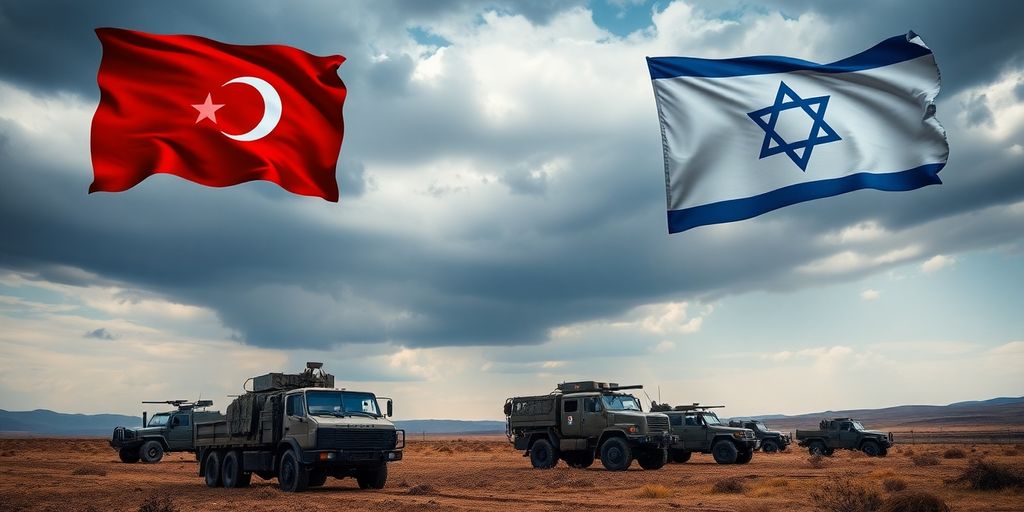Recent military actions have intensified the rivalry between Turkey and Israel, particularly in Syria, where both nations are vying for influence following the collapse of the Assad regime. Israel’s airstrikes on Syrian military bases, including the T4 airbase, have raised concerns about Turkey’s growing presence and ambitions in the region.
Key Takeaways
- Israel has increased airstrikes in Syria, targeting military sites to counter Turkey’s influence.
- Turkey plans to establish military bases and air defense systems in Syria, raising tensions with Israel.
- Both nations are exploring a deconfliction line to prevent military misunderstandings.
Background of the Conflict
The recent escalation began with Israel’s airstrikes on April 2, 2025, targeting several military installations in Syria, including the T4 airbase. These strikes were a direct response to Turkey’s plans to deploy military assets in the region, which Israel views as a significant threat to its security.
Israel’s Defense Minister, Israel Katz, emphasized that these operations were necessary to protect Israeli interests and prevent hostile forces from gaining a foothold near its borders. The Israeli military has been actively targeting sites believed to harbor threats, particularly those associated with Sunni jihadist groups supported by Turkey.
Turkey’s Military Ambitions
Turkey’s military strategy in Syria has evolved significantly since the fall of the Assad regime. Key points include:
- Establishment of Military Bases: Turkey aims to set up bases in strategic locations, including the T4 airbase, to enhance its military presence.
- Deployment of Air Defense Systems: Plans are underway to install advanced air defense systems to protect Turkish assets and deter Israeli air operations.
- Support for Sunni Rebel Groups: Turkey has historically supported Sunni jihadist factions, which complicates the security landscape in Syria and raises alarms in Israel.
Israeli Concerns
Israel’s primary concerns regarding Turkey’s actions in Syria include:
- Increased Military Presence: The establishment of Turkish bases could limit Israel’s operational freedom in the region.
- Potential for Conflict: Any miscommunication or accidental engagement between Israeli and Turkish forces could escalate into a broader conflict.
- Influence of Sunni Extremism: Israel fears that Turkey’s support for Sunni jihadist groups could lead to the formation of a hostile front along its borders.
Diplomatic Efforts and Deconfliction Talks
In light of the escalating tensions, both Turkey and Israel have engaged in discussions to establish a deconfliction line. This initiative aims to prevent misunderstandings and potential clashes between their military forces. Key aspects of these talks include:
- Direct Communication: Establishing a communication link to facilitate dialogue and reduce the risk of accidental confrontations.
- Mutual Interests: Both nations have expressed a desire to avoid direct conflict, recognizing the need for stability in Syria.
- U.S. Involvement: The United States is seen as a potential mediator in facilitating an agreement between the two nations, given its strategic interests in the region.
Conclusion
The rivalry between Turkey and Israel in Syria is a complex interplay of military strategy, regional influence, and historical animosities. As both nations navigate this precarious landscape, the potential for conflict remains high, underscoring the need for diplomatic solutions to ensure stability in the region. The coming weeks will be critical in determining the trajectory of their relationship and the future of Syria.
Sources
- Israel steps up Syria strikes, says Turkey aims for ‘protectorate’, Reuters.
- Turkey and Israel are becoming deadly rivals in Syria, The Economist.
- Israel, Turkey ponder how to split Syria into spheres of influence until stable gover, Ynetnews.
- Seeding Türkiye’s Future: The Growth and Challenges of the Turkish Seed Sector, Seed World.
- Turkey and Israel mull deconfliction line in Syria, sources say, Middle East Eye.






